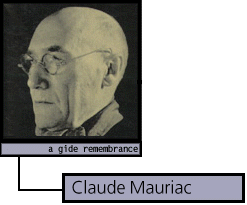
Claude Mauriac, born in 1914, was the son of
Francois Mauriac. French critic of literature
and film he wrote among other things studies of
Jean Cocteau and Marcel Jouhandeau.
This excerpt is taken from Mauriac's book
Conversations with Andre Gide
(George Braziller, Inc., 1965)
Gide does not show signs of life until (Andre) Dubois admits to having been much amused by le Treizieme Arbre, a little play that was given recently, and which Gide himself had advised me to miss. Indeed, had not he been the very first to walk out? He looks delighted: "Oh yes ... That's what everyone says ... They all do laugh ... All told it was almost a success!" He laughs through clenched teeth.
We walked on a while through the night. Gide left us at La Place Chappe. He disappeared at an exhausted pace in his shepherd's greatcoat. Dubois and I sang his praises. One thing I said, perhaps rather naively, was "The miracle is that he has no idea who he is. His excessive humility is astonishing. We are used to the haughty bearing of lowly pen-pushers. And lo and behold the greatest of living writers, Andre Gide, is self-effacing, well-behaved as a beginner."
Dubois agreed and went on to describe his own surprise and embarrassment the first time Gide appeared in his office a few days ago: "The idea that I was actually seeing Andre Gide overpowered me. He meant so much to me growing up. I was moved at making his acquaintance, but all I saw before me was a man who begged my pardon for wasting my time, a man who asked for what I would have proudly done, and done a hundredfold, as though it were a singular request. He acted self-conscious and that and his air of humility increased my own nervousness - I probably behaved as if I were feebleminded."
Friday - July 14, 1939
Before lunch I saw him in the salon reciting a poem to Miss Adams, who corrected his pronounciation from time to time, Keats, eighty lines by heart ...
"How long did it take you to learn that?" young Michel asked him in astonishment.
"Three years ..."
And as he recited this poem I could not understand, fervent attention in his warm and tender voice, I admired him ... No, he has not given up cultivating himself, this old man with a young man's heart always and a young man's face still ... My father walks into the middle of the recitiation. Doubtless he too was as astonished.
While I write this a torrential rain beats the panes of my window. I can hear brief howls, muffled cries: it is Gide, after his nap, playing chess with Mme. de Lestrange. I picture him as he looked last night, and the night before last before he read to us: considering out loud the pros and cons, hesitating, playing after long delays, taking his move back, playing it over again, sighing, clearing his throat just to shout when his opponent moved her rook or her knight, "Oh, now, that is annoying! What am I to do?" - he coughs, sighs, his face screwed up by the effort of concentration; his unoccupied hand plays upon the green baize with whatever it comes upon ...